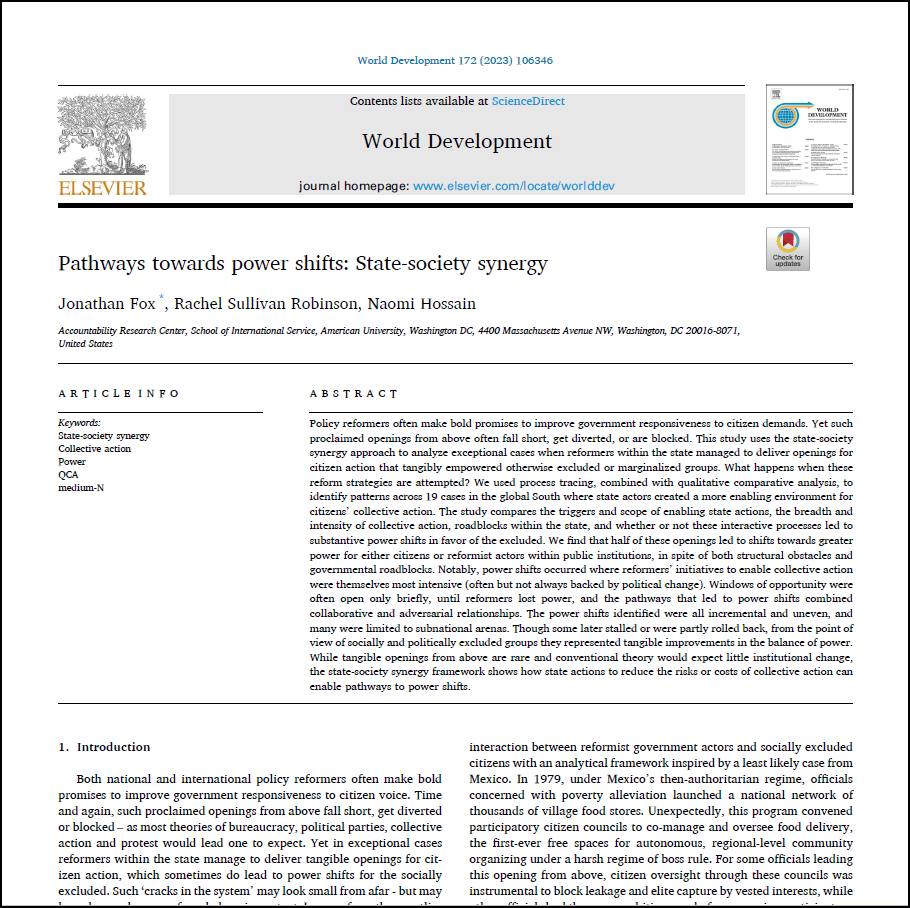
Pathways Towards Power Shifts: State-Society Synergy
Date: September 2023
Author(s): Jonathan Fox, Rachel Sullivan Robinson, Naomi Hossain
Publication type: Scholarly journal article
Published by: World Development
Policy reformers often make bold promises to improve government responsiveness to citizen demands. Yet such proclaimed openings from above often fall short, get diverted, or are blocked. This study uses the state-society synergy approach to analyze exceptional cases when reformers within the state managed to deliver openings for citizen action that tangibly empowered otherwise excluded or marginalized groups. What happens when these reform strategies are attempted? We used process tracing, combined with qualitative comparative analysis, to identify patterns across 19 cases in the global South where state actors created a more enabling environment for citizens’ collective action.
The study compares the triggers and scope of enabling state actions, the breadth and intensity of collective action, roadblocks within the state, and whether or not these interactive processes led to substantive power shifts in favor of the excluded. We find that half of these openings led to shifts towards greater power for either citizens or reformist actors within public institutions, in spite of both structural obstacles and governmental roadblocks. Notably, power shifts occurred where reformers’ initiatives to enable collective action were themselves most intensive (often but not always backed by political change). Windows of opportunity were often open only briefly, until reformers lost power, and the pathways that led to power shifts combined collaborative and adversarial relationships.
The power shifts identified were all incremental and uneven, and many were limited to subnational arenas. Though some later stalled or were partly rolled back, from the point of view of socially and politically excluded groups they represented tangible improvements in the balance of power. While tangible openings from above are rare and conventional theory would expect little institutional change, the state-society synergy framework shows how state actions to reduce the risks or costs of collective action can enable pathways to power shifts.
Jonathan Fox is Professor and Director of the Accountability Research Center at the School of International Service, American University. He works with a wide range of public interest groups, social organizations, private foundations, and policymakers to learn from transparency, participation, and accountability initiatives. For publications, see: www.jonathan-fox.org.
Rachel Sullivan Robinson is Professor and Senior Associate Dean, School of International Service, American University. She is a sociologist and demographer whose research focuses on global health interventions in sub-Saharan Africa, including family planning, HIV/AIDS, and sexuality education. She has done research in Namibia, Malawi, Nigeria, and Senegal, and current projects relate to politicized homophobia in sub-Saharan Africa and the extent of social science knowledge on NGOs.
Dr Naomi Hossain is a political sociologist and professor at SOAS University of London, who is also a visiting scholar at the Accountability Research Center at the School of International Service at American University. Her research focuses on the politics of inclusive development, or how people get the public services they need. In international collaborations, she has researched food and fuel riots, the politics of public service delivery, closing civic space, and the politics of Bangladesh’s development success. Some of her work can be seen here.
